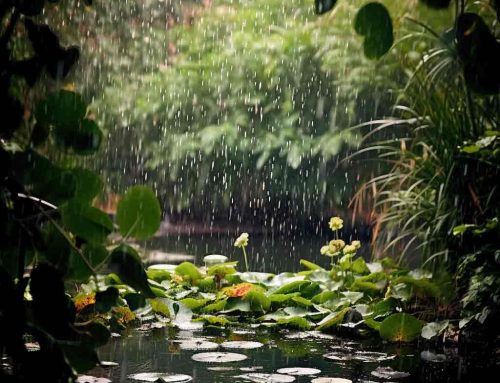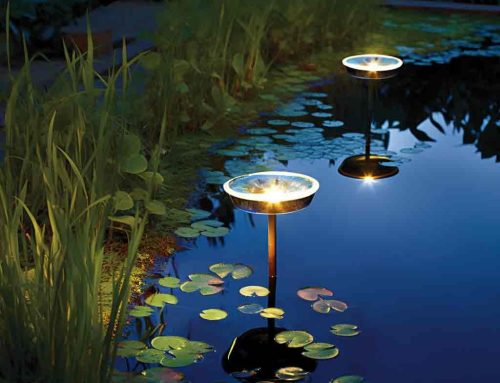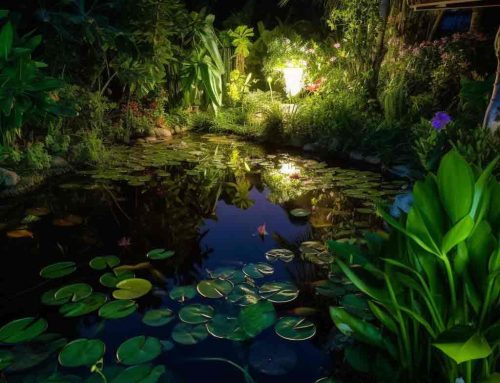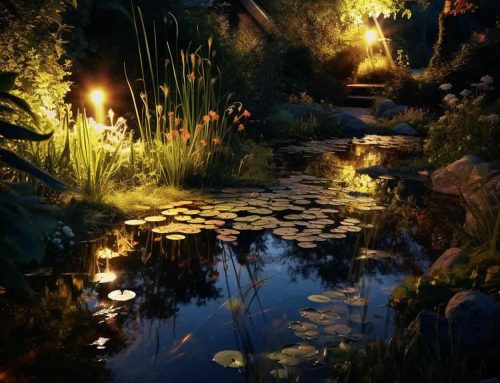Today, we shall delve into the fascinating relationship between light and your pond and to guide you through the various aspects of light and its impact on your aquatic oasis. So, grab a cuppa and join me as we explore the importance of light for your pond and its inhabitants. We have a section on pond lights if you want to add some evening ambience also!
Do ponds need light?
In short, yes. Light plays a vital role in maintaining a balanced pond ecosystem. Sunlight is essential for the process of photosynthesis, which allows aquatic plants to convert sunlight into energy, release oxygen, and provide a natural habitat for your fish. The right balance of light also helps regulate the growth of algae and supports the overall health of your pond.
Should a pond be in sun or shade?
Striking the perfect balance between sun and shade is crucial for a thriving pond. Ideally, your pond should receive a mix of direct sunlight and partial shade throughout the day. Aim for 4 to 6 hours of direct sunlight per day, as this is sufficient for most aquatic plants to thrive. Partial shade can help prevent excessive algae growth and keep water temperatures from rising too high during hot summer days.
How do I cover my pond from the sun?
There are several ways to provide shade and protect your pond from excessive sunlight:
- Aquatic plants: Planting floating or marginal plants, such as water lilies or water hyacinth, can create natural shade and help maintain a balanced ecosystem.
- Pond umbrellas or sails: These specially designed, UV-resistant fabrics can be installed over your pond to provide temporary or permanent shade.
- Pergolas and arbours: Constructing a pergola or arbour near your pond can offer both shade and an attractive focal point for your garden.
- Strategic landscaping: Planting trees or tall shrubs around your pond can create dappled shade and offer protection from the sun.
Can fish see in low light?
Fish have a remarkable ability to see in low light conditions. Their eyes contain specialised cells called rods, which are highly sensitive to low light levels. This allows fish to navigate and search for food in murky water or during dawn and dusk. However, prolonged exposure to complete darkness or insufficient light can lead to stress and may affect their overall well-being.
Do fish prefer light or dark?
Fish generally prefer a balance of light and dark. During daylight hours, fish rely on sunlight to regulate their internal clocks and maintain healthy behaviours such as feeding and reproduction. At night, fish require periods of darkness to rest and recover. Providing your fish with a natural day-night cycle is essential for their well-being.
Do ponds need sunlight?
Yes, ponds do require sunlight to support a healthy ecosystem. Sunlight is crucial for the process of photosynthesis in aquatic plants, which in turn provides oxygen and shelter for your fish. Additionally, sunlight can help maintain a stable water temperature and promote the growth of beneficial bacteria in your pond.
How does light affect a pond?
Light has a significant impact on your pond’s ecosystem:
- Photosynthesis: Light is essential for aquatic plants to perform photosynthesis, which supports the overall health of your pond.
- Water temperature: Sunlight can help maintain a stable water temperature, which is crucial for the well-being of your fish and plants.
- Algae growth: While some sunlight is necessary, excessive light can promote the growth of nuisance algae, leading to green water or blanket weed. Don’t forget that using UV light is important for algae control
- Fish behaviour: Light affects your fish’s natural behaviours, such as feeding, breeding, and resting, making it essential to provide them with a balanced day-night cycle.
Understanding the role of light in your pond is vital for maintaining a healthy and balanced aquatic environment. By striking the right balance between sunlight and shade, you can create a harmonious ecosystem that allows your fish and plants to thrive.
Factors to consider when managing light in your pond
To ensure your pond receives the appropriate amount of light, keep the following factors in mind:
- Pond location: When designing your pond, consider its orientation and position within your garden. Aim to place it in an area where it can receive a mix of direct sunlight and partial shade throughout the day.
- Surrounding vegetation: Regularly trim overhanging trees and shrubs to prevent excessive shade, which can lead to poor plant growth and reduced oxygen levels.
- Seasonal changes: Keep in mind that the angle and intensity of sunlight can vary throughout the year. Adjust your shading methods, if necessary, to accommodate seasonal fluctuations in light exposure.
- Fish species: Be mindful of the light preferences of your specific fish species. While most pond fish appreciate a balance of light and dark, some species may have unique requirements that need to be accommodated.
Monitoring and adjusting light levels
Regularly assess the light levels in your pond and make adjustments as needed. Here are some signs that your pond may require more or less light:
- Excessive algae growth: If you notice persistent green water or excessive blanket weed, your pond may be receiving too much sunlight. Increase shade using aquatic plants or shading devices to help control algae.
- Poor plant growth: If your aquatic plants are not thriving, they may be receiving insufficient light. Consider reducing shading or relocating your pond to a sunnier spot.
- Fish stress: Observe your fish for signs of stress, such as lethargy or erratic behaviour, which could be caused by improper light conditions. Adjust the light levels to ensure your fish are comfortable and healthy.
In conclusion, light plays a crucial role in the well-being of your pond and its inhabitants. By understanding the importance of light and managing its levels effectively, you can create a thriving aquatic environment that will delight both you and your fish. So, go on and embrace the power of light to transform your pond into a vibrant, healthy oasis. Happy pond keeping, dear enthusiasts!
Last Modified: May 12, 2023







